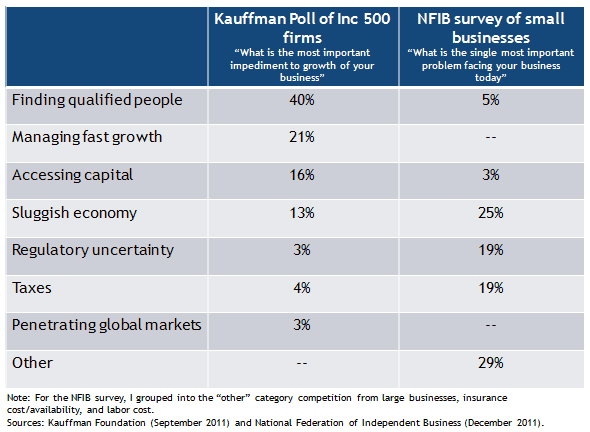In a macroblog post yesterday, Dave Altig, research director at that Atlanta Fed, discussed some recent research from the Federal Reserve Bank of Cleveland focused on the relationship between uncertainty and job creation by small businesses. That research, which is based on survey responses from members of the National Federation of Independent Businesses (NFIB), found that a high degree of uncertainty was correlated with a scaling back in hiring plans.
Yesterday’s macroblog post also delved into the connection between small business hiring plans and actual job creation, pointing out that this connection requires further examination because job creation has not, contrary to popular conversation, been a broad characteristic of the population of small businesses. Instead, it has tended to be young businesses (and especially businesses less than seven years old) that account for most of the job creation. Most young businesses are small, but relatively few small businesses are young.
I believe that understanding the job creation challenges we currently confront may require that we increasingly turn our attention to the factors restraining the high growth sectors of the economy. Some evidence from this segment of the business universe came from a recent poll of fast-growing firms that the Kauffman Foundation conducted at the Inc. 500/5000 conference in September. This table summarizes the results of that poll, which are juxtaposed with roughly comparable responses from the NFIB survey.

The interesting thing about the Kauffman survey is that the overwhelming problem reported by those companies that are in growth mode is the inability to find qualified workers. That observation is important because it bears on such questions as: To what degree is our elevated unemployment rate structural? How do we explain the observation that the number of unemployed workers appears to be elevated relative to the number of reported job vacancies? and so on.
It is obviously not appropriate to extrapolate from a single snapshot of a sample of fast-growing firms to the U.S. economy as a whole—and that is not the message here. But it is increasingly clear that the search for a single smoking gun that will clarify what is happening in labor markets is likely to be a hopeless quest. The answer to the question asking what a jobs agenda would look like is like your Christmas wish list: one size probably does not fit all.
Disclaimer: This page contains affiliate links. If you choose to make a purchase after clicking a link, we may receive a commission at no additional cost to you. Thank you for your support!



Leave a Reply